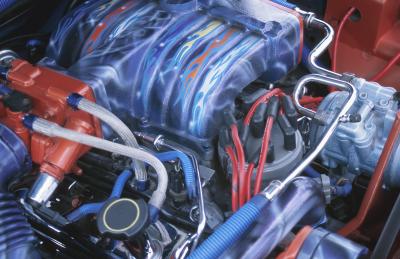
The fuel pump, like the rest of the fueling system, is a fairly simple device. Fuel pump failures almost always result in a drop in fuel pressure, which may affect fuel economy: just not the way you think. If you suspect your fuel system of costing you dollars at the pump, then consider every aspect of it before sinking your money into a new pump.
At its core, an engine is just a big chemical conversion device. It uses the chemical energy stored in fuel to create pressure and heat, which pushes on the pistons to create mechanical energy. This conversion event happens via combustion, which is what happens when you combine fuel and oxygen in just the right proportions and ignite it. Gasoline engines are oxygen limited, meaning that they're designed to run out of air before they do fuel. Bear this in mind as you think about what the fuel pump does.
A fuel pump doesn't just move the fuel, as its name indicates: It pressurizes the fuel line. Carbureted applications rarely need more than about 10 psi of fuel pressure, owing to the fact that the fuel pressure itself only feeds into a fuel reservoir in the carburetor. Fuel-injected engines, though, require far higher pressures to shove fuel through the tiny orifice in the injector. Low fuel pressure will reduce the amount of fuel going through, while higher fuel pressures will increase it to a point.
All else being equal, only a fuel-rich condition will cause your engine to drop in fuel economy. A rich condition happens when there's more fuel going through the engine than the oxygen required to burn it. A drop in fuel pressure -- via a malfunctioning pump or clogged filters -- would starve the engine of fuel, causing a lean or fuel-poor condition. Fuel pump failures typically come in one of two varieties: Either the motor fails or the pump vanes wear out. In both cases, you're looking at a drop in fuel pressure and fuel starvation.
While fuel pumps do tend to fluctuate in pressure before they fail, rarely will you find the pressure spike above the factory setting. So, that leaves not the fuel pump, but the fuel pump pressure regulator as the most likely suspect here. A bad pressure regulator or failing fuel pressure sensor may allow the pump to run at a higher psi than the factory setting. If fuel pressure runs consistently high, the injectors will pump slightly more fuel through than they should. This could, hypothetically, result in a drop in fuel economy if the computer doesn't have a program to compensate for the increased fuel pressure.
While fuel pump failures won't often cause a drop in fuel economy, different computers have different methods of dealing with them. For instance, if a computer detects a rapid drop in system pressure, it may open the injectors more to compensate. If the fuel pressure fluctuates back up to normal with the injectors open farther, more fuel goes in and the engine goes rich. Since it takes more time for the gas to go through the engine than it does for the pressure sensor to react, such pressure fluctuation could cause a net increase in fuel-to-air ratio and a drop in fuel economy. This situation is fairly unlikely, but not impossible depending upon your particular system.